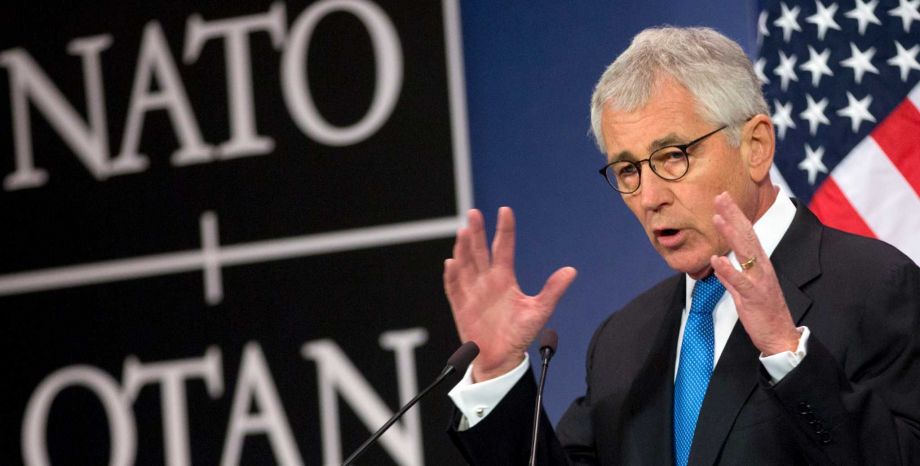U.S. Secretary of Defense Chuck Hagel speaks during a media conference at NATO headquarters in Brussels on Thursday, Feb. 5, 2015. NATO’s chief announced Thursday the alliance is set to more than double the size of its Response Force in response to Russian aggression in Ukraine and the challenge of Islamic extremism. NATO secretary-general Jens Stoltenberg, speaking to reporters before the opening of a meeting of defense ministers, said they were expected to agree to boost the size of the force from 13,000 to 30,000.
BRUSSELS (AP) — Defense Secretary Chuck Hagel said Thursday he is worried about a potential division within NATO as countries in the north want to focus on the growing threat from Russia, while other alliance members in the south are more worried about the influx of foreign fighters from northern Africa.
In his final appearance at a NATO meeting as secretary, Hagel delivered a sobering message to the allies, saying they must be able to address all challenges on all fronts at the same time.
"I am very concerned by the suggestion that this alliance can choose to focus on only one of these areas as our top priority," Hagel said at a news conference in Brussels. "This is a time for unity, shared purpose, and wise, long-term investments across the spectrum of military capability."
Hagel, who resigned under pressure from President Barack Obama's Cabinet, is expected to be replaced as early as next week by Ashton Carter, whose nomination hearing before the Senate Armed Services Committee was on Wednesday.
NATO nations have long been split over where the alliance should focus its resources. And the events of the last year, with Russia threatening one NATO flank and Islamic extremists terrorizing the other, has only sharpened that debate.
Russia's annexation of the Crimean peninsula and its military support for separatists along Ukraine's border have unsettled countries in Eastern Europe, including the Baltics and Poland, who worry they may be next.
At Thursday's meeting, in fact, NATO defense ministers were poised to more than double the size of the alliance's Response Force -- a move largely aimed at Russian actions in Ukraine, although some argue the capabilities could be used in other crises.
Meanwhile, the flow of foreign fighters from northern Africa, including those aligned with militant Islamic groups, has destabilized regions and escalated fears of terror attacks in countries across southern Europe. The recent terror attack in Paris has only escalated those concerns.
Derek Chollet, who until last month was the assistant defense secretary for international security, said that while some people have predicted that the differing views could break the alliance apart, that so far hasn't happened.
But, he said, more work needs to be done to shore up the allies.
"We do have to walk and chew gum," said Chollet, now a senior adviser at the German Marshall Fund of the United States. He said the consistent U.S. message to NATO nations needs to be "we need to do both. You can't just worry about one problem and forget about the other. Even though they're very different, they both present a huge challenge to the alliance."
Hagel struck a less strident tone in his final message to NATO than his two predecessors did.
Tired of the U.S. bearing the brunt of the military responsibilities for the alliance, Robert Gates, in 2011, delivered a grim speech warning that NATO faced a "dim if not dismal future" because of European penny-pinching.
Two years later, Leon Panetta used his speeches to push the alliance to be more innovative and find ways to contribute more resources.
Hagel on Thursday took a more optimistic approach, saying that while the challenges are demanding, he believes NATO will be up to the task.
Julianne Smith, senior fellow at the Center for a New American Security, said allies will be "doing a lot of naval gazing," questioning whether the alliance can both protect itself and its members while also mustering forces and capabilities for battles in places like Afghanistan, Iraq or Syria.
"A lot of these countries are saying, I'm sorry, if I'm sitting in the Baltic States or if I'm Poland -- the only thing I really care about right now is the Russian bear, and I want to insure that the Russians don't come for us," said Smith, who held policy jobs focused on Europe at the Pentagon and on the vice president's staff.
But countries like Turkey or Portugal aren't that worried about Moscow. Instead, they're watching Islamic militants storm across Syria and Iraq. Thousands of refugees are streaming across their borders and foreign fighters from North Africa are slipping toward their shores.
"For Americans the answer seems obvious," said Smith. "We simply have to try and do it all and be prepared for multiple scenarios. But for small countries that have very limited funding and a public that's a little skittish right now, it's a much tougher question to answer."
http://www.sfgate.com/news/politics/article/Hagel-concerned-about-possible-split-in-NATO-6064239.php
